Related Research Articles
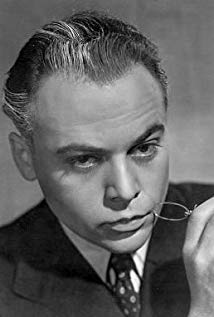
Herbert Charles Angelo Kuchačevič ze Schluderpacheru, known professionally as Herbert Lom, was a Czech-British actor who moved to the United Kingdom in 1939. In a career lasting more than 60 years, he generally appeared in character roles, often portraying criminals or suave villains in his younger years, and professional men as he aged. Highly versatile, he proved a skilled comic actor in The Pink Panther franchise, as Chief Inspector Charles Dreyfus.
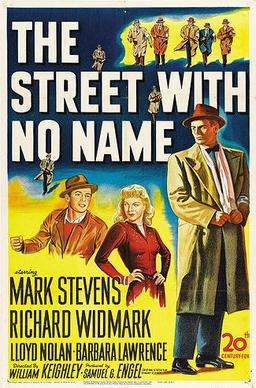
The Street with No Name is a 1948 American film noir directed by William Keighley. A follow-up to The House on 92nd Street (1945), it tells the story of an undercover FBI agent, Gene Cordell, who infiltrates a deadly crime gang. Cordell's superior, FBI Inspector George A. Briggs, also appears in The House on 92nd Street. The film, shot in a semidocumentary style, takes place in the Skid Row section of fictional "Center City."

Commander K. M. Nanavati vs. State of Maharashtra was a 1959 Indian court case where Kawas Manekshaw Nanavati, a Naval Commander, was tried for the murder of Prem Ahuja, his wife's lover. Commander Nanavati, accused under section 302, was initially declared not guilty by a jury, but the verdict was dismissed by the Bombay High Court and the case was retried as a bench trial. The case is often erroneously believed to be the last jury trial in India, but there were several trials afterwards that used juries, some well into the 1960s. Nanavati was finally pardoned by Vijayalakshmi Pandit, newly appointed Governor of Maharashtra and sister of Prime Minister Jawaharlal Nehru.
It Happened Tomorrow is a 1944 American fantasy film directed by René Clair, starring Dick Powell, Linda Darnell and Jack Oakie, and featuring Edgar Kennedy and John Philliber. It is based on the one-act play "The Jest of Haha Laba" by Lord Dunsany.
Naked Alibi is a 1954 American film noir crime film directed by Jerry Hopper and starring Sterling Hayden, Gloria Grahame and Gene Barry. It was released on October 1, 1954 by Universal-International. Portions of the film were shot in Tijuana.

Death on the Nile is a 1978 British mystery film based on Agatha Christie's 1937 novel of the same name, directed by John Guillermin and adapted by Anthony Shaffer. The film features the Belgian detective Hercule Poirot, played by Peter Ustinov for the first time, plus an all-star supporting cast that includes Maggie Smith, Angela Lansbury, Bette Davis, Mia Farrow, Jane Birkin, David Niven, George Kennedy, and Jack Warden. The film is a follow-up to the 1974 film Murder on the Orient Express.
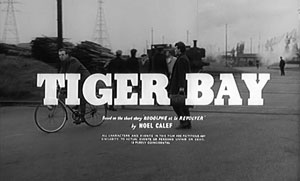
Tiger Bay is a 1959 British crime drama film based on the short story "Rodolphe et le Revolver" by Noël Calef. It was directed by J. Lee Thompson, produced by John Hawkesworth, and co-written by John Hawkesworth and Shelley Smith. It stars John Mills as a police superintendent investigating a murder; his real-life daughter Hayley Mills, in her first major film role, as a girl who witnesses the murder; and Horst Buchholz as a young sailor who commits the murder in a moment of passion.

Never Let Go is a 1960 British thriller film starring Richard Todd, Peter Sellers and Elizabeth Sellars. It concerns a man's attempt to recover his stolen Ford Anglia car. Sellers plays a London villain, in one of his rare serious roles.
Enter a Murderer is a detective novel by Ngaio Marsh; it is the second novel to feature Roderick Alleyn, and was first published in 1935. The novel is the first of the theatrical novels for which Marsh was to become famous, taking its title from a line of stage direction in Macbeth, and the plot concerns the on-stage murder of an actor who has managed to antagonize nearly every member of the cast and crew. Unfortunately for the murderer, Inspector Alleyn is in the audience. This novel marks the first appearance of Alleyn's sidekick, Inspector Fox.

Town on Trial is a 1957 British mystery film directed by John Guillermin and starring John Mills, Charles Coburn, Barbara Bates and Derek Farr. A whole town comes under suspicion when two grisly murders are carried out—particularly members of the local sports club.

Operation Diplomat is a 1953 British drama film directed by John Guillermin and produced by Ernest G. Roy.
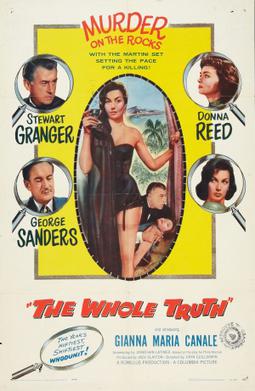
The Whole Truth is a 1958 British-American thriller film directed by John Guillermin and starring Stewart Granger, George Sanders, Donna Reed, Gianna Maria Canale and Peter Dyneley. It was based on the 1955 play of the same title by Philip Mackie.

The Mystery of Mr. X is a 1934 American pre-Code crime film starring Robert Montgomery as a jewel thief who gets mixed up in a series of murders in London. It is based on the 1933 novel X v. Rex by Philip MacDonald, was remade in 1952 as The Hour of 13.
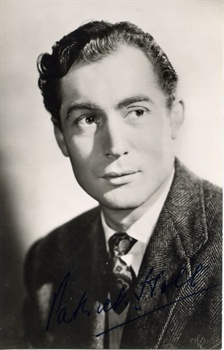
Patrick Holt was an English film and television actor.

The Falcon Strikes Back is a 1943 American crime film directed by Edward Dmytryk and stars Tom Conway as the title character, the amateur sleuth, the Falcon. Supporting roles are filled by Harriet Hilliard, Jane Randolph, Edgar Kennedy, with Cliff Edwards filling in for Allen Jenkins as the Falcon's sidekick, "Goldie" Locke. It is the fifth film in the Falcon series and the second for Conway, reprising the role that his brother, George Sanders had initiated.
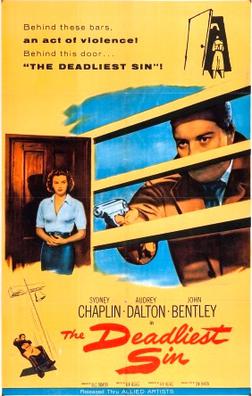
Confession, released in the United States as The Deadliest Sin, is a 1955 British drama film directed by Ken Hughes and starring Sydney Chaplin, Audrey Dalton and John Bentley.

Peter Reynolds was an English actor.

The Falcon in Hollywood is a 1944 crime film directed by Gordon Douglas and stars Tom Conway in his recurring role as a suave amateur sleuth, supported by Barbara Hale, Jean Brooks, and Rita Corday. The film was the 10th of 16 in Falcon detective series.
The Red-Haired Alibi is an American pre-Code feature-length film produced by Tower Productions. The film was produced by Sigmund Neufeld. The title is often written as Red-Haired Alibi.

Mr Smart Guy' is a 1941 Australian play by Alec Coppel that was later filmed as Smart Alec (1951).
References
- ↑ "Smart Alec (1951)". BFI. Retrieved 7 December 2019.
- ↑ Chibnall, Stephen; McFarlane, Brian (23 October 2009). The British 'B' Film. Palgrave Macmillan. p. 123. ISBN 9781844575749.
- ↑ "SMART ALEC". Monthly Film Bulletin. Vol. 18, no. 204. London. 1 January 1951. p. 253.
- ↑ Vagg, Stephen (17 November 2020). "John Guillermin: Action Man". Filmink.